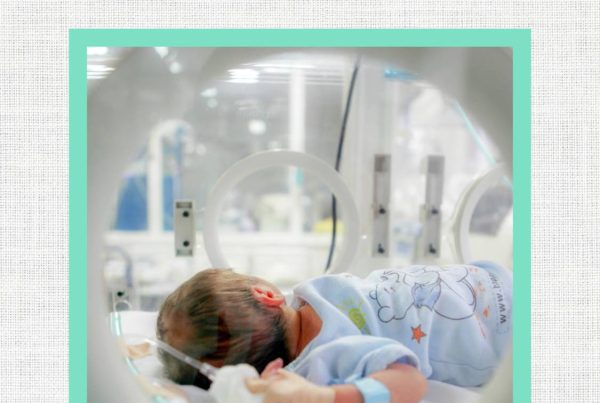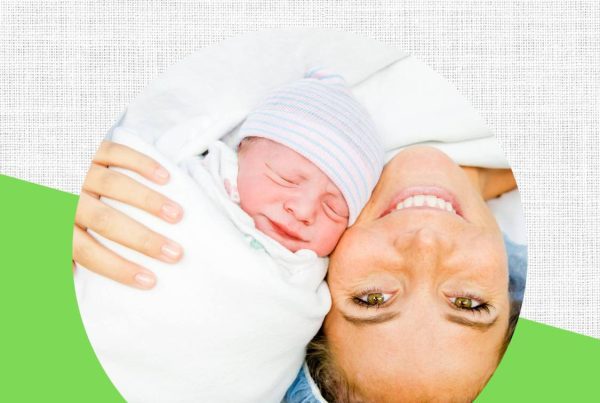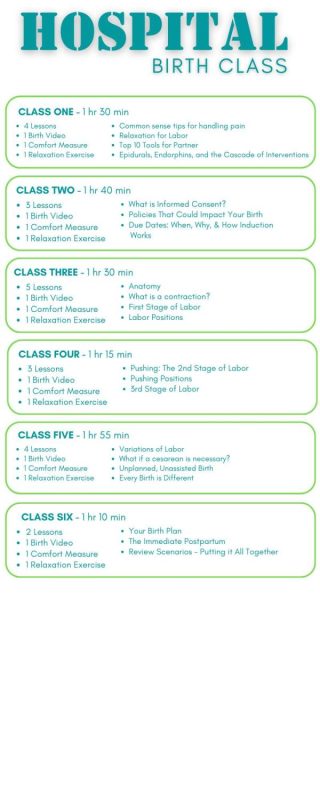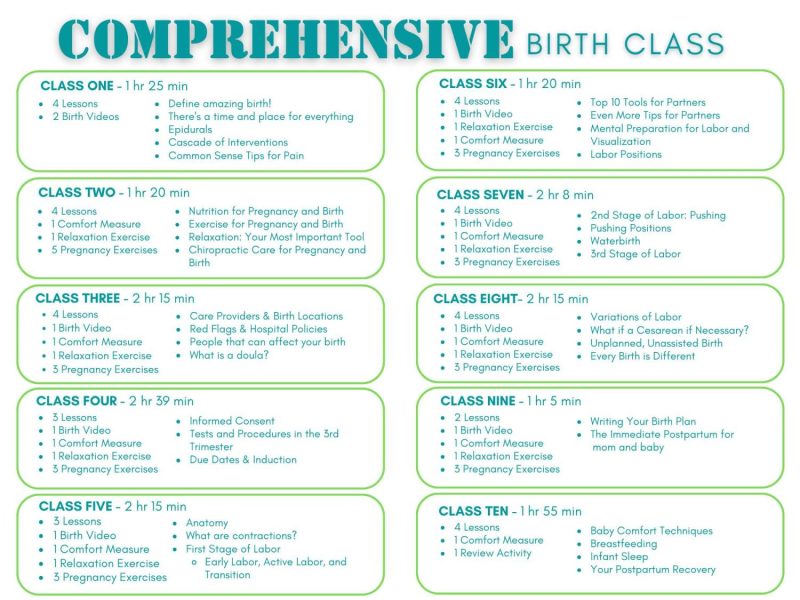Rhesus (Rh) incompatibility is a pregnancy topic that is very near and dear to my heart, since my blood type is Rh negative and my husband’s is Rh positive. My midwife discussed it with us early in my pregnancy, and I spent a lot of time researching it on my own.
What is the Rh factor? There are four main blood types : A, B, AB, and O. Blood types are further classified according to whether or not there is a specific protein found on the surface of the red blood cells. If the protein is there, the blood type is Rh positive. Otherwise, your blood type is Rh negative. About 83-85% of people are Rh positive, meaning 16-17% are Rh negative.
Why does it matter? Most of the time, it doesn’t. The one time it is really important, though, is during pregnancy. If a woman who has Rh negative blood is pregnant by a man whose blood is Rh positive, there is at least a 50% chance that the baby will also have Rh positive blood. When an Rh negative mother is pregnant with a baby who is Rh positive, it is called Rh incompatibility.
If Mom’s blood is exposed to Baby’s blood, her immune system will recognize the Rh protein as a foreign substance and will produce antibodies in response. (When this happens, the mother is now Rh sensitized or isoimmunized.) Those antibodies can in turn cross the placenta and enter Baby’s bloodstream, where they will attack Baby’s Rh positive red blood cells. If Baby’s blood cell count gets too low, he could develop hemolytic disease.
What happens next? Depending on when sensitization happens, the result could be mild or severe or somewhere in between. If a baby develops hemolytic disease while still in the womb, intrauterine blood transfusions may be necessary to stabilize Baby’s blood cell levels. The most common result of hemolytic disease is severe anemia at birth, but it can also cause jaundice, or even brain damage or heart failure.
Don’t freak out yet! If this is your first pregnancy, there is likely not much to worry about. During pregnancy, your blood and your baby’s blood do not usually intermingle; the risk of isoimmunization during pregnancy, especially a first pregnancy, is only about 2%. Some things that can put you at risk for isoimmunization are:
- amniocentesis
- chorionic villus sampling (CVS)
- bleeding during pregnancy
- blunt trauma to the abdomen
- placenta previa
- placental abruption
- prior miscarriage
- prior termination
- external cephalic version (to turn a breech baby)
- ectopic pregnancy
How can I prevent Rh sensitization? The most common medical way is through the use of injected Rh immune globulin, most commonly known as RhoGAM. Referred to as a blood-based vaccine, RhoGAM contains antibodies to the Rh protein, is believed to destroy fetal blood cells in the mother’s blood supply before her blood has a chance to make her own antibodies against them. It is administered as an intramuscular injection, usually into the buttocks.
Most doctors want to give pregnant women a prophylactic dose of RhoGAM at 28 weeks; this provides the mother with a passive immunity in case of slight placental tears or some other form of trauma. RhoGAM is also given if a Rh negative woman undergoes amniocentesis, CVS, or some other invasive form of testing. According to the package insert, “if RhoGAM is administered… early in pregnancy (before 26 to 28 weeks), there is an obligation to maintain a level of passively acquired anti-D by administration of RhoGAM at 12-week intervals.†This is because RhoGAM is thought to only be effective for 12 weeks after you receive it.
The Rh protein is present on the blood cells of an Rh positive baby starting around 8 weeks. So if miscarriage or termination occurs after that, or an ectopic pregnancy lasts at least that long, then there is a risk of isoimmunization.
Otherwise, RhoGAM is recommended to be given within 72 hours of delivery if the baby has Rh positive blood. (After birth, a simple test of the cord blood can determine the baby’s blood type.) If Baby has Rh negative blood too, than RhoGAM is completely unnecessary. The 72-hour-deadline is somewhat controversial; there is little information one way or the other regarding effectiveness after that time period. The package insert does say that in one study, RhoGAM provided protection in 50% of women who were given it 13 days after delivery.
Note that RhoGAM does not do any good if it is given after a woman has become sensitized. To be effective, it must be given before isoimmunization occurs. And once a woman becomes sensitized, those antibodies are with her for life. Any future pregnancies will automatically be considered high risk as a result.
RhoGAM is thought to be safe. It is made using antibodies derived from human plasma, but the donors of the blood have been “carefully screened by history and laboratory testing to reduce the risk of transmitting blood-borne pathogens.†The plasma undergoes fractionation and filtration to further ensure safety of the finished product.
As with any pharmacological product, RhoGAM has side effects. These include: injection site reactions (swelling, redness, mild pain, warmth), skin rash, body ache, headache, fatigue, and slight elevation in temperature. Also possible are signs of a hemolytic reaction, which may include: fever, back pain, nausea, vomiting, hypo- or hypertension, hemoglobinuria/emia, elevated bilirubin and creatinine, and decreased haptoglobin. Allergic reactions are rare, and no fatalities due to anaphylaxis have ever been reported. The package insert indicates that you should be observed for at least 20 minutes after receiving the shot, presumably to watch for signs of allergic reaction or other severe side effect.
RhoGAM is a Pregnancy Category C drug. According to the package insert, “The available evidence suggests [RhoGAM] does not harm the fetus or affect future pregnancies or the reproductive capacity of the maternal recipient.†Pregnancy Category C is described thus: “Animal reproduction studies have shown an adverse effect on the fetus and there are no adequate and well-controlled studies in humans, but potential benefits may warrant use of the drug in pregnant women despite potential risks.†Basically, the FDA believes the benefits to the mother outweigh potential risks to the baby.
Some babies have been born with minor Rh sensitization, presumably from prenatal exposure (that prophylactic dose at 28 weeks). This fact is confirmed by the product insert.
The Healthy Pregnancy Book says, “If within a couple of days after birth baby tests Rh positive, baby may also be given an injection of RhoGAM.†The book does not say what the purpose of this administration would be. The package insert, however, expressly instructs, “Do not inject the newborn infant.â€
Some have concerns about RhoGAM related to the other ingredients. RhoGAM was once formulated with thimerosol, which contains mercury, but does not seem to be anymore. There are still concerns among some that RhoGAM may contain mercury or aluminum, although RhoGAM’s website declares that it contains no preservatives.
Is it effective? Studies seem to indicate so. Rates of isoimmunization vary depending on the source. Up to 10-14% of women may become Rh sensitized without RhoGAM. That number drops to less than 2% when RhoGAM is given postpartum, and to 0.1-0.2% if given during pregnancy as well.
How else can I reduce my chances of becoming Rh sensitized? It is always important to stay as healthy as possible during your pregnancy. Here are some other ideas, in addition to the RhoGAM shot:
- Make sure your diet has adequate protein. A pregnant woman needs at least 80 grams of protein daily. For that matter, make sure your entire diet is healthy. A whole foods diet will help make your placenta as strong as possible, which will reduce your risk of isoimmunization.
- 1000mg of vitamin C daily may help strengthen the membranes. Vitamin C is necessary for tissue repair and wound healing, and your body needs it to produce collagen (see next bullet point).
- Avoid fluoridated water and toothpaste. Fluoride has been shown to interfere with collagen production, and collagen fibers are what attaches the placenta to the uterine wall.
- Take 1 gram of powdered activated charcoal daily; activated charcoal absorbs toxins in your system, which can keep you from getting sick. Do not use at the same time as you take any other supplements, because it may interfere with absorption of them.
- Take 1 teaspoon of magnesium powder dissolved in water daily. Among other important functions, magnesium helps your body build and repair tissues.
- Kelp, sea vegetables, and mineral supplements can help strengthen the placenta. Sea vegetables are a good source of iodine, a lack of which has been linked with preterm birth and miscarriage. Kelp also contains potassium, calcium, and iron.
- Take 1/2 cup of elderflower infusion daily. The use of elderflower in pregnancy is considered controversial by some (discuss with your care provider first!), but it is thought to be helpful for anti-inflammatory purposes and detoxification. It contains antioxidents, which help protect you from cellular damage.
- Consider delayed cord clamping. According to Sheila Kitzinger in The Complete Book of Pregnancy & Childbirth, “If a woman is Rh negative with an Rh positive baby, there is a case for delayed cord clamping. If the cord is clamped while still pulsating, fetal blood is retained in the placenta, blood vessels rupture as the uterus contracts, and the chances of Rh positive blood being pushed back into the mother’s bloodstream are greatly increased.â€
- Let the third stage of labor progress at its own pace and avoid cord traction, especially before the placenta has separated from the uterine wall on its own.
- Consider placentophagy. According to placentabenefits.info, “A very interesting adaptive theory is that consuming placenta may actually affect the mother’s immune system, by suppressing her body’s inclination to create antibodies as a response to antigens present in the baby’s blood… Placentophagia may actually cause a suppression of this response, allowing her to have successful subsequent pregnancies.â€
Sources:
- The Complete Book of Pregnancy & Childbirth by Sheila Kitzinger
- The Healthy Pregnancy Book by William Sears, MD, and Martha Sears, RN
- Heart & Hands by Elizabeth Davis
- “Rh: Choices and Considerations in Pregnancy†(fact sheet distributed by my midwife, which draws on information from Holistic Midwifery and Understanding Diagnostic Lab Tests During the Childbearing Year by Anne Frye)
- Package insert for RhoGAM
- RhoGAM FAQs
- Pregnancy Category : Wikipedia
- “The Rh Factor and the Childbearing Year,†Witnessing Birth (blog)
- “RhoGAM Ultra-Filtered Plus,†Drugs.com
- “The Rh Factor,†Birth a Miracle (blog)
- “Placentophagy as an Adaptive Biological Behavior,†placentabenefits.info
- “Magnesium in your pregnancy,†BabyCenter.com
- “Activated Charcoal for Pregnancy,†CharcoalRemedies.com
- “How to Use Activated Charcoal,†WellnessMama.com
- “Activated Charcoal: Bottom Line Monograph,†Natural Medicine Journal
- “What are the Natural Benefits of Elderflower?,†Allergease
- “Elderflower : Queen of the Hedgerow,†Whispering Earth (blog)
- “Vitamin C in your pregnancy diet,†BabyCenter.com
- “Iodine in your pregnancy diet,†BabyCenter.com
Disclaimer: I am not a medical professional, and my intent with this article is not to tell you what to do. Please discuss with your care provider and work together to make an informed decision regarding your care.
This article is used with permission and first appeared here :
http://hollyscudero.birthbootcamp.biz/2013/10/09/the-rh-factor-your-pregnancy/
 Holly Scudero is a Birth Boot Camp natural childbirth instructor in San Diego, California. She is the mother of one beautiful boy born joyfully at home.
Holly Scudero is a Birth Boot Camp natural childbirth instructor in San Diego, California. She is the mother of one beautiful boy born joyfully at home.








Thank you so much! I found this very helpful! I’m hoping I do not have to worry about this, but if I do I now know what to research to aid in decision making!
I’m curious about the research on mothers with O blood type and negative Rh factor and father with A or B positive blood type. It seems there is research to suggest that since the mother’s blood type is O, her own antibodies act faster than the Rh antibodies….so her body is doing essentially the same thing as Rhogam, except the antibodies from Rhogam leave her body, yet her own do not. I have contacted the manufacturer and they cannot explain to me why this is…? It seems this would render Rhogam unnecessary in such cases, since the risk is practically nil. Any thoughts/comments?
Hey! I was wondering if you could point me to any info about the O- mama married to the B+ dad bc that’s me! I have never heard what you were saying about the moms antibodies destroying faster than the rhogam or whatever you meant but would really like to learn more about it! Thank you!
my daughter is o neg , baby daddy is positive, she is 32 weeks preg, no rogam shot so far, not a fan, anyway, at 31 weeks she was not sensitized yet, I have read rgam could splinter off and infect the baby ….I DEF INTERESTED IN THE O NEG MAKING HER OWN NATURAL ANTIBODIES…..ANYONE?